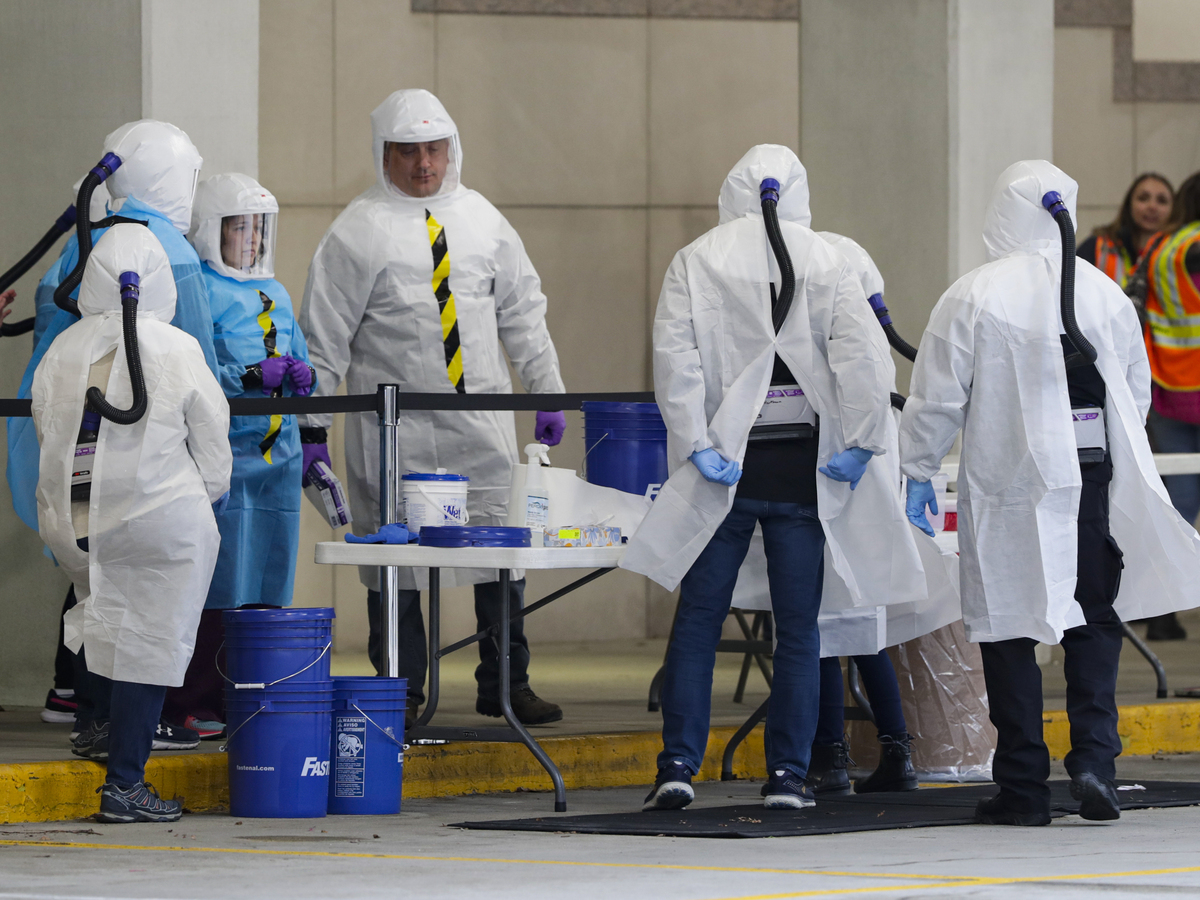5 Of The World’s Smartest Economists Share Ideas On Saving The Economy Avoid layoffs at any cost. Set up emergency financing for states and cities to help health systems. Cut regulations to speed medical response. Those are some recommendations from leading economists.
Economists say helping the health care sector, including through emergency financing to states and cities, is one of the steps urgently needed to weather the coronavirus crisis. Michael Conroy/AP
toggle caption
Michael Conroy/AP

Economists say helping the health care sector, including through emergency financing to states and cities, is one of the steps urgently needed to weather the coronavirus crisis.
Michael Conroy/AP
The U.S. economy has been staggered and shocked by the coronavirus pandemic. A stock market meltdown was followed by a more seismic event — waves of business shutdowns, putting millions of jobs at risk.
The moment is unprecedented because we are fighting a deadly contagion and a sudden economic downturn simultaneously. Both health and material well-being are at risk. That makes the way out even more challenging. And there’s no guaranteed playbook from past economic downturns to rely on — because this one is like no other.
We emailed or spoke to five of the world’s leading economists to share their top ideas. Here are edited excerpts of what they had to say.
Megan Greene, a global economist and senior fellow at Harvard Kennedy School. She says the priority for politicians must be to limit the harm to the most vulnerable workers — those in hourly service jobs as well as owners of small businesses.
- A federally supported work-sharing program
- Work-sharing has been used very successfully in Germany and the Netherlands in the face of economic downturns. Rather than lay off workers, an employer cuts their hours. In the U.S., those workers could then either receive a tax credit from the government or claim unemployment insurance to make up some of the lost pay.
- Work-sharing reduces the payroll burden for small and medium-sized businesses so that they have a chance of staying afloat until the crisis subsides. And when the recovery kicks in, those firms are able to ramp back up quickly rather than having to recruit and train new workers.
Penny Goldberg, an economics professor at Yale University and former chief economist of the World Bank Group. She says the priority of economic policy should be to contain the health care crisis.
- Move massive resources to the health care sector. Take measures to increase the supply of masks, sanitizer, alcohol, respirators and ventilators.
- Act fast. Use the Defense Production Act. We should approach the current situation as war, not just an economic crisis. Ensure that deductibles, copayments and any other out-of-pocket health care costs are waived. Everyone in need of medical care should get it, independent of their ability to pay.
- Ban evictions of people who can’t pay the rent; ban foreclosures; hold off on bankruptcy filings.
- The extra $1,200 (or more) to every person is a great idea. It would be even better if it were targeted toward those in need. But implementing this fast is more important than getting it just right.
- Avoid layoffs at any price. Wherever possible, switch to part-time work or fewer hours. If companies do not have the cash to pay employees, don’t pay them, but keep them on the books. Keeping one’s job (even if only an illusion of a job) will provide much-needed psychological support and signal that we are in this together. Otherwise, we are risking not recession but complete collapse of civil order.
- Extraordinary times call for extraordinary measures.
- Beyond these measures, governments need to offer calm reassurance that they will reinvigorate the economy post-crisis. After the crisis, aggressive fiscal stimulus will be imperative.
Tyler Cowen, an economics professor at George Mason University and host of the Marginal Revolution economics blog. He says bureaucratic obstacles are impeding the effort to fight the coronavirus.
- De-bureaucratize America.
- Regulatory restrictions from the Food and Drug Administration have kept America from developing its full drug-testing capacity.
- Regulatory restrictions from the Centers for Disease Control and Prevention and other agencies made it harder to gear up mask production.
- Vaccines face many regulatory hurdles, many medical imports face tariffs and other restrictions, and in general our response has been hampered by bureaucracy.
- Institutional review boards within universities have made it difficult for many researchers to work on the coronavirus in a prompt manner.
Jeffrey Sachs, a professor of sustainable development at Columbia University. He says the economy cannot begin to recover until critical public health steps are in place. He sent along several ideas.
- A lockdown to break transmission of the virus, lasting several weeks at a minimum and then progressively eased. Rapid scale-up of testing and tracing capacity to get out of the lockdown phase. Girding the health sector for the surge of illness now occurring.
- Emergency and immediately available federal financing for states and cities providing money for the health sector and the social support of the lockdown (health and social workers, protection equipment, isolation areas, etc.).
- Expanded unemployment compensation and tax credits to keep workers on payroll. Most of this is debt financed.
Gita Gopinath, chief economist of the International Monetary Fund. She says help must go to the workers most immediately affected by the moves taken to control the outbreak.
- Prioritize those who most need the support.
- Workers in the restaurant, transport and hospitality sectors are some of the hardest hit by the need for social distancing. Each day, more are being laid off or put on unpaid leave. These workers need income support to feed their families, and governments will need to send them money to keep them afloat.
- Targeted support from government can be in the form of cash transfers, tax relief or extended unemployment benefits.
- Eligibility for unemployment insurance should also be expanded; its duration and benefits should be increased.
